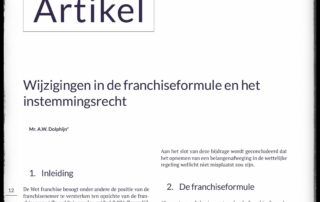Market and market share
Some remarkable decisions have recently been made in the field of franchising and competition law, including with regard to the competition law system under which the various franchise organizations fall.
If franchise organizations wish to make use of the advantages offered by the so-called European Block Exemption Regulation on vertical agreements, which covers franchising, their market share should not exceed 30%.
However, the question is: 30% of what? This question has recently been argued over and over again in court. In concrete terms, the preliminary relief judge has based the preliminary relief proceedings on the market share in franchise concepts. If this line of reasoning is followed, the market share is of course much higher than if the total number of providers is taken into account. If the latter reasoning were to be followed, all points of sale of a product in question would count. It is this last line of reasoning that is described as guiding in the explanatory notes to the exemption regulation. However, the fact that the Interim Relief Judge followed a completely different line of reasoning is in itself remarkable, if not surprising. In the first place, there is no support for the reasoning followed in the existing regulations. Secondly, following such a line of reasoning means that it is, all things considered, impracticable to use franchise concepts that make use of the advantages of the Exemption Regulation. After all, this means that the market share must be compared with other franchise organisations. This means that a large number of franchise organizations suddenly appear to have a very large market share in relation to this theory. In concrete terms, for example, they can no longer stipulate exclusive purchase clauses of 80% or 100%.
The question is, however, whether the reasoning of the Interim Relief Judge will hold. This will be further determined on appeal. It is difficult to imagine that the regulatory system in the field of competition law will also be overruled on appeal. Even if that is the case, the conclusion seems obvious that this is an incident in which this line of reasoning was chosen once for reasons of its own. Care should therefore be taken not to distil a general theory from this, but it will be clear that it is of eminent importance to keep a close eye on developments in this area.
Ludwig & Van Dam franchise attorneys, franchise legal advice

Other messages
Mitigation of fine due to ‘dominant position’ of franchisor
Mitigation of fine due to 'dominant position' of franchisor ...
It is a non-competition clause at the end of the lease
In the judgment of 26 March 2024, ECLI:NL:GHSHE:2024:1035, the Court ...
Looking ahead: Bottlenecks at the end of the franchise agreement
Of course, everyone starts a collaboration with good courage. But ...
Not just a successful appeal to incorrect forecasts
Not just a successful appeal to incorrect forecasts Introduction ...
Changes to the franchise formula and the right of consent
An article by Mr. was published in the leading legal ...
The National Franchise podcast
Guests on the National Franchise podcast are: Theodoor Ludwig ...







